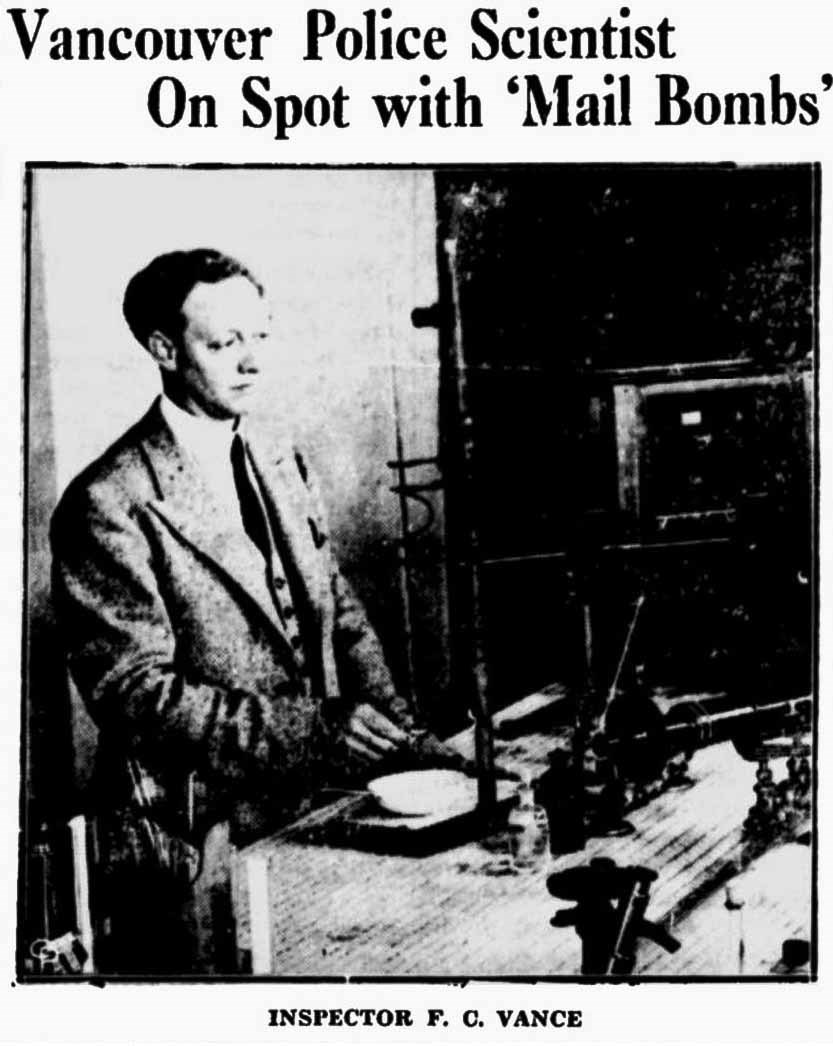A Vancouver time travelogue brought to you by Past Tense.
John F.C.B. Vance was a scientist hired by the City of Vancouver in 1905 as an analyst. His early work for the City was pretty mundane, things like testing milk and water quality. But at some point the Vancouver Police started calling on Vance for his scientific expertise, and he was on his way to carving out a niche as a pioneer in police forensics. Before long he was given the honorary title of Police Inspector.
Inspector Vance solved numerous cases in his lab (where the Police Museum is today) using techniques that are now fairly routine, at least on CSI, like ballistics testing and, in at least one case, matching the dust on a suspected yegg's clothing to dust from a blown safe. Vance was proud to point out that his work more often decisively exonerated suspects who would otherwise have to live under a cloud of suspicion even if they were acquitted in court.
Vance occasionally helped solve cases in other jurisdictions and became a well known expert in the field who was often referred to as a "modern Sherlock Holmes." His work brought considerable positive publicity to the VPD, though he wasn't always appreciated by his bosses, who were more concerned with politics than crime fighting in the 1930s. After National Home Monthly Magazine did a feature article on Vance in their September 1935 issue, Chief Constable Foster issued a memo:
In the attached paper is an article upon the work of Inspector Vance. The publication of such articles by those outside the Department is of course beyond control, but I think it should be generally understood that where reference is made to anything concerning the work of this Department by active members of the Force, approval should first be obtained.This is not a matter for General Order so much as a little talk on the subject so that the general policy may be understood.
Herbert Darling, a PR savvy RCMP superintendent who was helping the inexperienced Foster restructure the police force, thought Foster's memo didn't go nearly far enough. "A General Order should be published," Darling wrote to Foster,
to the effect that under no circumstances should any person in any way connected with the Vancouver City Police Department give information or material to the press, magazine publishers or broadcasting agencies except on the authority of the Chief Constable.
In the next police budget, Vance was only given $4000 for new equipment instead of the $10,000 he requested.
One gauge of Inspector Vance's effectiveness was that six attempts were made on his life in the 30s, including mail bombs, car bombs, and an attacker that threw acid on him.
J.F.C.B. Vance retired in 1942, but he continued working on his longtime pet project of developing a method of criminal identification using scent, based on the idea that everyone emits an odour that is as unique as their fingerprints, but which can't be easily covered with gloves.
Sources: Image: Drummondville Spokesman; police memos: City of Vancouver Archives, Vancouver police fonds, series #197, 75-E-7, file 9; National Home Monthly, September 1935




